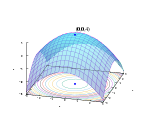PDFO
 | |
| Original author(s) | Michael J. D. Powell |
|---|---|
| Stable release | v1.0
/ June 10, 2020 |
| Repository | github |
| Written in | MATLAB, Python |
| Engine | |
| Operating system | Linux, macOS, Microsoft Windows |
| Platform | x86, x86-64 |
| Available in | English |
| Type | Optimization software |
| License | GNU Lesser General Public License |
| Website | www |
![]() Search PDFO on Amazon.
Search PDFO on Amazon.
PDFO (Powell's Derivative-Free Optimization solvers)[1] is a cross-platform package providing interfaces for using Michael J. D. Powell's derivative-free optimization solvers, including COBYLA, UOBYQA, NEWUOA, BOBYQA, and LINCOA, which were originally implemented in Fortran 77. PDFO is recommended in the Decision Tree for Optimization Software [2] under the category of "The general nonlinear Problem; Using function values only".
Powell devised the solvers in PDFO to tackle general nonlinear optimization problems of continuous variables with or without constraints using only function values but not derivatives of the objective function or nonlinear constraint functions. [3] In practice, such functions are often black boxes defined by simulations.[4][5] [6] PDFO can automatically identify the optimization problem and then call one of Powell's Fortran solvers: UOBYQA and NEWUOA are invoked for unconstrained problems, NEWUOA being preferred except for rather small problems, [7][8] BOBYQA for bound-constrained problems, [9] LINCOA for linearly constrained problems, and COBYLA for nonlinearly constrained optimization problems.[10] [11]
The current version of PDFO supports MATLAB and Python. It relies on MEX for MATLAB and F2PY for Python to compile the Fortran solvers and wrap them into user-friendly functions.
PDFO is distributed under the GNU Lesser General Public License (LGPL).[1]
See also[edit]
- Michael J. D. Powell
- List of optimization software
- Derivative-free optimization
- Simulation-based optimization
References[edit]
- ↑ 1.0 1.1 "Homepage of PDFO". Retrieved 2020-04-14.
- ↑ Mittelmann, Hans D. "Decision Tree for Optimization Software". Retrieved 2020-07-03.
- ↑ M. J. D. Powell (2007). A view of algorithms for optimization without derivatives. Cambridge University Technical Report DAMTP 2007.
- ↑ Conn, A. R.; Scheinberg, K.; Vicente, L. N. (2009). Introduction to Derivative-Free Optimization. MPS-SIAM Book Series on Optimization. Philadelphia: SIAM. Retrieved 2014-01-18. Search this book on

- ↑ Audet, Charles; Harre, Warren (2017). Derivative-Free and Blackbox Optimization. Springer Series in Operations Research and Financial Engineering. Berlin: Springer. Retrieved 2020-04-19. Search this book on

- ↑ Larson, J.; Menickelly, M.; Wild, S. M. "Derivative-free optimization methods". Acta Numerica. Retrieved 2020-04-19.
- ↑ Powell, M. J. D. (2002). "UOBYQA: unconstrained optimization by quadratic approximation". Mathematical Programming, Series B. 92 (3): 555–582. CiteSeerX 10.1.1.28.1756. doi:10.1007/s101070100290.
- ↑ Powell, M. J. D. (November 2004). The NEWUOA software for unconstrained optimization without derivatives (PDF) (Report). Department of Applied Mathematics and Theoretical Physics, Cambridge University. DAMTP 2004/NA05. Retrieved 2014-01-14.
- ↑ Powell, M. J. D. (June 2009). The BOBYQA algorithm for bound constrained optimization without derivatives (PDF) (Report). Department of Applied Mathematics and Theoretical Physics, Cambridge University. DAMTP 2009/NA06. Retrieved 2014-02-14.
- ↑ Powell M. J. D. (1994). "A Direct Search Optimization Method That Models the Objective and Constraint Functions by Linear Interpolation". Advances in Optimization and Numerical Analysis: 61–67. Retrieved 2020-04-25.CS1 maint: Date and year (link)
- ↑ Xi, Min; Sun, Wenyu; Chen, Yannan; Sun, Hailin (2020). "A derivative-free algorithm for spherically constrained optimization". Journal of Global Optimization. 76: 841–861. Retrieved 2020-07-03.
External links[edit]
- Latest version of PDFO
- Decision Tree for Optimization Software
- Homepage of PDFO
- GitHub repository of PDFO (mirrored on Gitee and GitLab)
- PDFO on PyPI
- MATLAB File Exchange of PDFO
- PDFO: Powell's Derivative-Free Optimization Solvers with MATLAB and Python Interfaces
- An introduction to PDFO in "宝藏数学家的优化人生", a biography of Michael J. D. Powell (in Chinese)
This article "PDFO" is from Wikipedia. The list of its authors can be seen in its historical and/or the page Edithistory:PDFO. Articles copied from Draft Namespace on Wikipedia could be seen on the Draft Namespace of Wikipedia and not main one.

